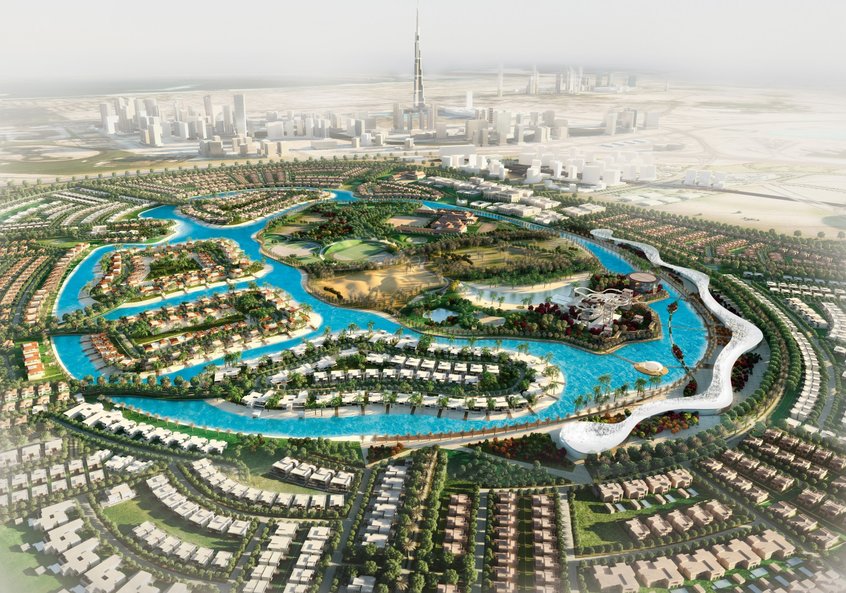House prices in Dubai have recorded the fastest rises in the world for the fourth consecutive quarter, according to agent Knight Frank’s latest report on the global real estate market. The year-on-year change for the first quarter of 2014 was almost 30%, reflecting the optimism with which international investors are now regarding the Dubai market.
Craig Plumb, head of research for the Middle East for agent Jones Lang LaSalle (JLL), said his research indicated a slightly lower rate of growth. He added that residential prices were still 15-20% below the peak they reached in 2008, but said they would probably pass that mark by about the end of this year.
“Our view at the moment is that the price growth is unsustainable,” he said. “We see prices in Dubai growing at an average of 23%. When you consider that the economy is growing by 5% and population is growing at 4%, then that is too fast.” He added that JLL expected price growth to moderate to about 10-15% over the course of the year.
The government of Dubai has recently taken action to calm the moderate price increases and deter “flippers” who buy and sell quickly. Unlike Abu Dhabi, it has maintained its cap on rent increases, and last September it doubled the transfer fee levied on property purchases to 4% of the property’s value. The United Arab Emirates’ (UAE’s) federal government acted in October to limit mortgages to 50% for off-plan purchases and 60% for expatriates buying a second home.
According to JLL, most of this growth is being driven by investment from outside the region. Kabir Mulchandani, the chief executive of investor SKAI Holdings, wrote in his blog that interest from Chinese investors has been a significant factor. He said: “In the past year, there has been a surge in demand from individual and commercial entities. Chinese investors spent $353m on land, residential units and office real estate in Dubai last year, according to data from the Dubai Land Department. For many of these investors, the city is an opportunity to diversify their investments; returns are more attractive than Hong Kong, Shanghai and Beijing. As such I expect an increasing number of developers to look eastward for financing and sales.”
Plumb played down the effect Expo 2020 is having on property sales. “The market here is driven by sentiment and confidence, and the Expo win increased that,” he said, “but it’s six years away and even then it’ll be great for the overall economy and for the hotels and industrial warehousing market but for offices and residential it won’t have such a big impact, and certainly not in 2014.”
He added that JLL supported the rental cap retained by Dubai. “It’s working very well. If there were no cap rents would go up more quickly and it would be even more scary. I think the government of Dubai realises that it has to remain an affordable city.”
Abu Dhabi’s growing too fast
According to a recent report by property agent Cluttons, the price of residential property in the emirate of Abu Dhabi rose 39% over the course of 2013, although that growth did fall from 14.4% in the third quarter to 7.7% in the fourth. There was a further small drop in the first quarter of this year, to 7.2%.
We see prices in Dubai growing at an average of 23%. When you consider that the economy is growing by 5% and population is growing at 4%, then that is too fast– Craig Plumb, head of research, Jones Lang LaSalle
One factor is the decision in January 2014 to allow buyers to own freehold title on properties. This has increased interest among Russian and Chinese buyers looking to take advantage of rapidly inflating prices. Another regulatory factor was the decision in the last quarter of 2013 to remove a cap on rent increases. This fuelled demand for freehold apartments as families looked to escape from the increasingly costly rental sector. In a report on the region, JLL said removing the cap would have a “major” impact on rents and that it would “welcome the introduction of a new, well-considered, rental control mechanism to keep Abu Dhabi cost-competitive.”
The regulatory environment is in flux right now, and how much regulation will ultimately be imposed on the real estate market is unclear. Saeed Eid Al Ghafli, the chairman of the Department of Municipal Affairs, said an integrated system of real estate laws and regulations was being prepared. It is expected that a new property index will be launched later this year, dividing Abu Dhabi city into 10 to 12 zones based on their rental levels.
But the main cause of the rapid increase in residential prices has been the freezing effect of the global recession. Now big schemes are coming on stream again. In the UAE as a whole about $50bn worth of construction projects are expected to be awarded, the highest total since 2008. According to consultant MEED, work has resumed on $17bn worth of stalled projects since the start of 2012.
Abu Dhabi is relying on an increase in supply to moderate the rise in prices. In April officials announced that 32,000 housing units would be added to the city’s stock. This is a 13% increase, and brings the total for homes in the city to 280,000. Cluttons comments that the most sought-after properties are those consisting of traditional residential neighbourhoods close to or on Abu Dhabi Island and within easy access to Sheikh Zayed Road. Its report commented that it was too early to assess how the flood of new properties would affect price growth in the market.
Sharjah and Ras al-Khaimah
One emirate that has benefited from the price rise in Abu Dhabi and Dubai has been Sharjah. Although it has a total population of only 800,000, it is attracting interest from buyers, partly because of its good transport links to Dubai, and partly because of the growth of its aviation sector, based around Sharjah airport. It has a growing number of international schools.

Phase one of Dubai’s Mohammed Bin Rashid city (pictured), which contains 1,500 villas, was inaugurated in January, with a completion date of 2019
Residential rental values in Sharjah leapt by almost 16% during 2013 as tenant demand surged and construction work remained in the doldrums. According to Cluttons’ first quarter report, rents rose 3.4% in the final quarter of last year, and by 4.5% in the first quarter of this year, which added up to a 19% year-on-year increase.
The greatest uplift in property prices occurred in Sharjah’s central business district of Al Qassimiya, which is about 30km from the centre of Dubai. Rents here rose 36% during 2013. Overall, rents for apartments in Sharjah increased 9% in the first quarter of this year, after rising by almost 20% last year.
As with Abu Dhabi, the strongest demand is for villas, particularly along the along the Sharjah Airport/Maliha Road corridor. As well as the spillover effect from Dubai, growth in Sharjah is being bolstered by expanding levels of economic activity; Sharjah’s state budget for 2014/15 rose 7% to $4.2bn, and about half will be spent on development.
Ras al-Khaimah (RAK), which occupies the northern tip of the UAE, is also benefiting from its relative affordability compared with its southern neighbours. The emirate has a population of about 231,000, of whom about two-thirds are expatriates. It has staked its future on tourism, based on its offer of beaches, mountains and archaeological sites.
The government is investing $500m in tourism development projects, which will bring the emirate’s total hotel and resort room inventory to 10,000 by 2016. The investment is complemented by global hotel chains and the establishment of a special investment zone. If this effort is successful, the country’s real estate sector could be a shrewd investment.
One indication of rising confidence is the decision in May this year to restart the $2.2bn Shah Rukh Khan Boulevard, which was put on hold in 2008. According to the Emirates 24/7 website, the scheme is being managed by US developer TSA Group on Dana Island. It will be a tourist resort containing several hotels, a shopping centre and commercial complexes spread across 6.3 million square metres.










